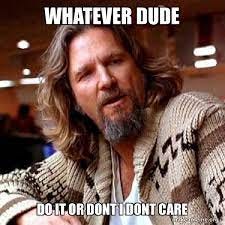One of my favourite sayings is from the inimitable Lily Tomlin: “The trouble with the rat race is that even if you win, you're still a rat”. This is true for investors as it is in life in general.
The classic ‘rat race’ in the investment world is the performance league table and the comparison of a fund’s performance vs. a benchmark. If you beat the benchmark or beat most of your peers, it’s all fine, but what do you do if you are behind?
Most studies have shown that investors who are at the bottom of a performance league table or who trail their benchmark tend to increase risk in their investments. It’s basically a head, I win (and get a bigger bonus or performance fee), tail you lose (because your underperformance gets even worse without much consequence for me). This effect of increased risk taking for the investors ranked at the bottom of the league table is particularly pronounced when there are monetary incentives linked to outperformance, like the famous 2 plus 20 rule used by hedge funds.
But a new lab study by researchers from Ben-Gurion University has shown something even stronger.
They recruited students at their university to participate in an investment game. Like most investment games, this one was constructed to reward people for good performance without penalties for excessive risk taking (this is why I hate the investment games played at schools and universities; the winners tend to be the most reckless but lucky participants, not the best investors). Participants got 1,000 Francs and could invest it either in risky assets or a risk-free asset paying alternatively 2% or 6% interest. The risky asset, meanwhile, paid a 5% risk premium over the risk-free asset with a volatility of 20%.
The investment game went on for 75 periods and at the end of each period, participants were informed about their rank relative to the other participants. At the end of the game, participants would be paid their cumulative profits from the game and the top-ranked participant would get an additional bonus. Participants who lost money would leave with nothing.
Of course, participants who saw that they were ranked near the bottom of the league table increased the risk in their portfolios in the hope to overtake their peers and end up at the top. But what was surprising to see in the experiment was that even investors who were ranked above average or near the top increased the risk in their portfolios. They were tantalisingly close to the top spot and knowing that was enough incentive to throw caution into the wind and try to overtake their peers to clinch the title as best performing participant (and the extra bonus and cachet that comes with it).
This confirms my own experience as an investor: Your performance tends to improve if you stop comparing it to other investors or some arbitrary benchmark. If you focus only on your investment process and what you can control, you are less stressed about your investment and give them more time to create long-term performance. You are less likely to sell assets that may go through a temporary drawdown, and you feel less pressure to just invests in what has worked most recently.
And while we are on the subject of not comparing yourself to others, this is also something that makes you happier in life.
Psychologists talk about the ‘hedonic treadmill’ where people chase more money, promotions and career progression in the hope that if they climb the next step on the ladder they will become happier. But instead, they remain as unhappy as they always were or may even become more unhappy. So, get of the treadmill and stop participating the rat race. I promise you it will increase your happiness and satisfaction more than any bonus or promotion ever could. Instead, compare your performance to the only person that matters: yourself.
But don’t be a slacker either who doesn’t care about anything. The Big Lebowski is a great fictional character but remember that he is fictional. Instead, try to get better at what you are doing every day, every month, every year. If you constantly strive to improve, you will inevitably become one of the best at what you are doing. And you don’t need to compare yourself to other people to know that.




Any article that includes a Lily Tomlin quote is a good one. ...And as she says, "the road to success is always under construction".
"Instead, try to get better at what you are doing every day, every month, every year. If you constantly strive to improve, you will inevitably become one of the best at what you are doing. And you don’t need to compare yourself to other people to know that."
Happiness is to be lucky enough to understand and pursuit this idea.